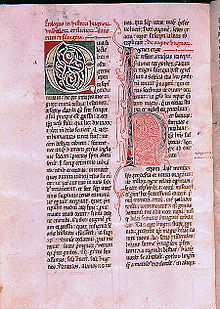- De rebus Hispaniae
-
De rebus Hispaniae or Historia gothica[1] is a history of the Iberian peninsula written in Latin by Archbiship of Toledo Rodrigo Jiménez de Rada en the first half of the thirteenth century on behalf of King Ferdinand III of Castile.
De rebus Hispaniae consists of nine books that contain the history of the peninsula from the first peoples to the year 1243. For the first time in Spanish historiography, Jiménez de Rada used sources from Al Andalus and developed a view of all the peninsular territories including the kingdoms of Aragon, Navarre, Portugal, Castile, León and León's predecessor the Kingdom of Asturias. The book dedicates a large section to the dominion of the Visigothic Kingdom; the chapter entitled, historia gothica, is very extensive and detailed. Other sections cover the other different peninsular peoples: Romans, Ostrogoths, Huns, Vandals, Suebi, Alans, Arabs, etc.
This work was widely accepted and was translated into most of the Romance languages. Over the centuries it has been a crucial source for the study of the History of Spain.
Editions
- Historia de los hechos de España. Introduction, translation, notes and indices by Juan Fernández Valverde. Madrid: Alianza Editorial, 1989.
Notes
- ^ De rebus Hispaniae is the original Latin title. Historia gótica is the later vulgar title. It is also known as the Cronicón del Toledano or Cronicón de las cosas sucedidas en España, or in English A General History of Spain.
Categories:- Medieval Spain
- 13th-century books
- 13th-century medieval Latin literature
- 13th-century history books
- History books about the Iberian peninsula
Wikimedia Foundation. 2010.

